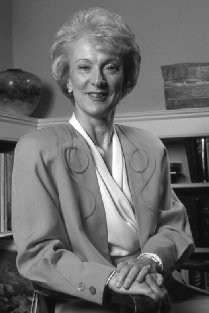Students and the Staying Power of the Liberal Arts
By KATHRYN MOHRMAN
mind is a fire to be kindled, not a vessel to be filled." This statement from Plutarch is the essence of our philosophy at Colorado College-a philosophy translated into action that has served generations of students with great success.

As I talk with alumni across the country, I am struck by the staying power of a liberal arts education. Maybe it is so durable because it is ultimately so practical. Of course students develop skills to use in future careers. And yes, they learn material that prepares them for graduate school. But more importantly, they learn how to ask fundamental questions about the world and they acquire the insights of multiple disciplines. All this clearly makes them better able to deal with real world problems that don't come in neat little boxes. But beyond the obvious, they learn how to become independent learners, so that they can continually enrich themselves and the world around them.
Students who choose Colorado College bring with them a variety of backgrounds, experiences, modes of learning, and levels of accomplishment. Author Howard Gardner is a leading proponent of the idea of multiple forms of intelligence. In his book, Frames of Mind, he describes seven kinds of intelligence: linguistic, musical, logical-mathematical, spatial, kinesthetic, access to one's own feelings, and ability to notice and make distinctions among other individuals. It becomes apparent quickly that what we have traditionally measured on IQ tests-linguistic and mathematical intelligences-represent only a small portion of Gardner's definition of human capacities. As a society, we need to understand, support, and reward many other ways of learning and knowing, for it is these different forms of learning and intelligence that are part of our society's reservoir of talent with which to attack the complex issues we face as a state and nation.
Part of the durability of a liberal arts education is that it complements and accommodates the idea of "multiple forms of intelligence." At Colorado College we take these "multiple intelligences" to create opportunities for students to learn and mature. From their very first day on campus, students take responsibility to exercise their intellect in ways they may never have done before. At New Student Orientation, I urge them to open their eyes wide and learn to see the world through different lenses-to develop a sophisticated understanding of the physical world and the human condition. I encourage them that no matter which course of study they pursue or which extracurricular activities they choose, to stop and realize how fortunate they are to be members of a college community that affords them the luxury of learning for its own sake.
To my delight but not surprise, students continue to rise to the challenge. "The Colorado College experience is the experience of a lifetime," a recent alumna commented. "The education you receive in the classroom is outstanding. Just as important, though, is what you learn less formally about your own culture, values, and beliefs, as well as those of your classmates." A senior philosophy major agreed. "For me, the liberal arts tradition encourages an openness to different perspectives and ideologies, which I think is really necessary in a world that's constantly getting smaller."
Alumni, for their part, concurred. As recently as the 1995 Block Plan evaluation, nearly 97 percent rated the college as good to excellent. An overwhelming 98 percent said they would recommend CC to future students.
Faculty as well have reflected on the qualities and characteristics of their students over the years. "My best experience at Colorado College was my relationship with students," according to the late Mary Alice Hamilton, Professor of Biology from 1950-1977. "They were so responsive and eager to learn. They were willing to experiment." English Professor Emeritus Neale Reinitz noted with pleasure that "the students at Colorado College haven't changed much in forty years: most of them come out of mainstream America, love the outdoors, and can still volunteer or picket for a noble cause."
Over the years, we have employed innovative methods to teach age-old lessons. Whether in a Freedom and Authority discussion, through a Venture Grant, or on an ACM off-campus program, we challenge students to take charge of their learning. We expect now, as we expected then, for students to assume professional and personal leadership, to engage as citizens in affairs of city, state, nation, and world, to possess a broad range of knowledge in the liberal arts and sciences, to master one chosen area of inquiry, to think critically, to reason analytically, to judge independently, to write and speak accurately and effectively, and to expand their intellectual curiosity and nurture a passion for lifelong learning. The opportunities for students to take responsibility have varied over the years, but the intent has remained constant.
Those students who choose to come to Colorado College know that education is not a quick fix, but a commitment, a journey. Our alumni attest to the long-lasting value of such an education. As we near the 125th anniversary of this institution, we salute the many generations of students who, in joining this community of learning, have proven that a mind is, indeed, a "fire to be kindled."